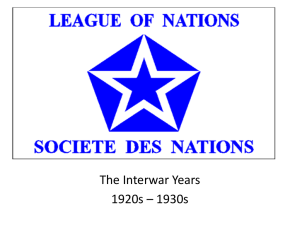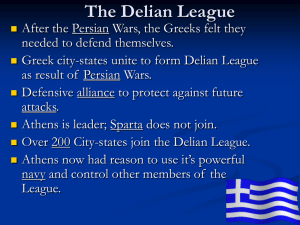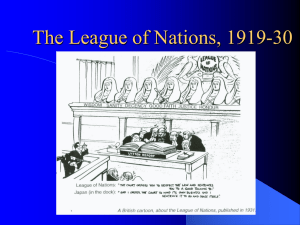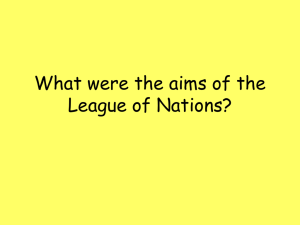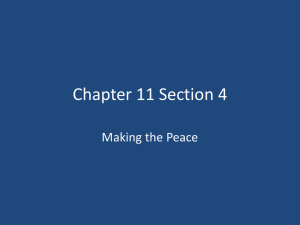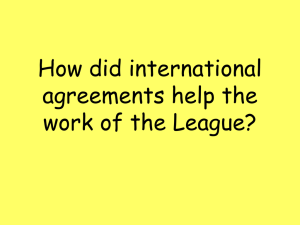League of Nations - Coatbridge High School
advertisement
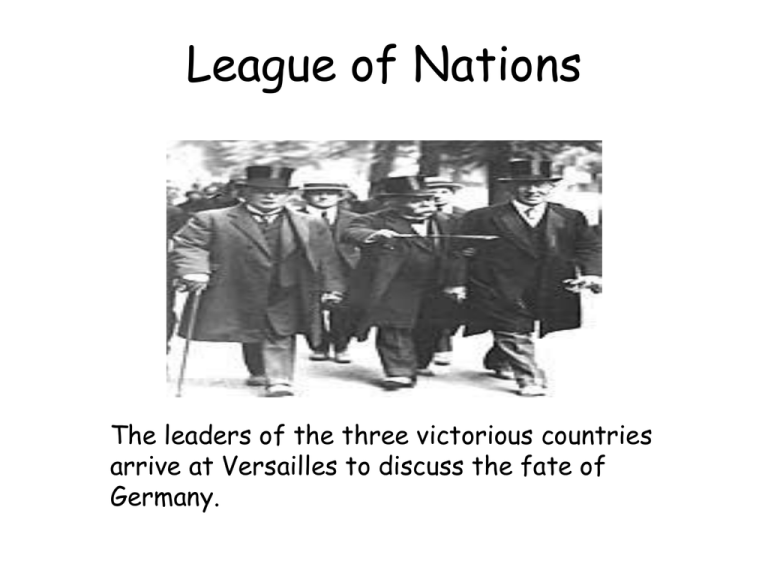
League of Nations The leaders of the three victorious countries arrive at Versailles to discuss the fate of Germany. • The League of Nations was introduced after being proposed by American President Woodrow Wilson at the T.O.V in 1919. • Came into operation on January 20th 1920 • It was the 14th of his 14 points and the only one to be acted upon. • It set out with the ambitious intention of creating world peace and preventing any further conflict. • In order to achieve this, the League had certain goals. The Aims of the League • Its aims were to: • Prevent any future wars, especially European wars • Actively encourage countries to disarm. • Tackle the growing problems of disease as well as improving people’s conditions in the workplace. • Overall, to make the world a safer, healthier place to live How was this going to be achievable? • In order to achieve this, the League had various organisations within it, as well as various “hard hitting” sanctions which could be applied. • The main body responsible and answerable to, within the League, was the Court of International Justice • This Court had the power to deal with countries who had broken the terms set by the League members and impose various sanctions such as trade embargos • It could also act as an arbitration council with countries who were in danger of going to war. Benefits/Strengths of the League • Every nation present at Versailles had signed up for the League. (except 1) • As time passed more nations saw the benefit of the League and joined up (58 by 1930) Weaknesses of the League • The L.O.N had far more weaknesses than strengths and fascist leaders such as Hitler and Mussolini were well aware of this. • The League had NO army to settle disputes • The League relied on arbitration to settle any issues • The USA, who proposed it, were not members • Germany and Russia were not allowed to join at first. • Germany felt ostracised as they found themselves surrounded by League members prepared to protect each other. • All decisions had to be agreed by a unanimous decision • More importantly, the stronger more aggressive nations who did not agree with the League’s decisions, simply left, leaving it a broken dream. Issues the League faced • In January 1923 French and Belgian troops occupied the Ruhr after reparation payments from Germany stopped • In the summer of the same year, Italy bombed the Greek island of Corfu. Actions of the League • As the League had no army to forcibly remove or stop these actions it was virtually powerless • When the league of nations discussed these 2 events, the governments of France and Italy threatened, if sanctions were applied, to withdraw from the organization. • Result = The League decided to take no further action against France or Italy Consequences • Countries who were members soon became disillusioned by the weakness of the League. • More importantly, non members and Fascist leaders soon realised these WEAKNESSES and could plot their next moves without fear Further failings of the League • One of the main objectives of the League was to seek disarmament. • They failed in this objective for many reasons. • France had a long standing fear, hatred, of Germany, therefore were not prepared to disarm whilst the Germans were still a threat. • “France will only disarm physically when Germany disarms morally” Further failings of the League • France had secured their position by fortifying the Maginot Line – a defensive stronghold between French/German border. • France also provoked anger by making alliances with Germany’s neighbours, Poland and Czechoslovakia – this encircled (surrounded) Germany • France were seen as being unwilling to cooperate in disarmament. Further failings of the League • Germany it seemed were willing to cooperate. • The Locarno Treaty of 1925 witnessed Germany accepting most of the terms of Versailles • Land lost to France and Belgium would remain with those countries • The Rhineland, a demilitarised buffer zone between France and Germany would remain this way • The Rhineland had always belonged to Germany, it was demilitarised for French safety!!! • Land lost by Germany in the East was not however discussed at Locarno. • The French were very concerned about this (remember this fact when studying Hitler’s Foreign Policy) • With France seemingly unwilling to disarm, Hitler in 1932 visited the Disarmament Conference in Geneva • He stormed out of the conference after other nations refused to disarm instead wanting Germany NOT to rearm Further failings of the League • The L.O.Ns were weakened by two further invasions. • The Japanese invasion of Chinese Manchuria in 1931.(both League members) • The Italian invasion of the African country of Abyssinia in1935 (both League members) • See further slides for more details.

